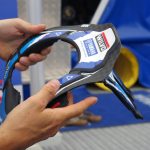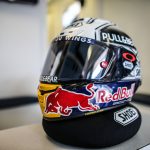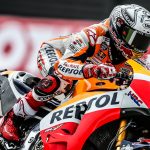Shortly after Anahiem 2 next year Thomas Covington will turn 23 years old. In that relatively short lifetime the grand prix winner has already traversed professional and personal life experiences far and beyond people three times his age.
#64’s decision to take a prime opportunity with the Rockstar Energy Husqvarna crew in AMA competition after five years of graft, accomplishment, anguish and setbacks in Europe was a bold one. It was made in the midst of a knee injury that initially limited his potential in the 2018 MX2 campaign; the irony coming after the announcement in France mid-season when he embarked on a eight-podium run in the next eleven rounds, including another victory in Turkey. Nine trophies in 2018 means Covington completed his best Grand Prix term at a time when he had one foot out of the door.
Thomas’ trajectory in MXGP was always far from linear.
An explosive start as a wild-card in the opening race in Qatar 2014 (while still on the books with Pro Circuit Kawasaki as an amateur) saw TC running as high as third in MX2. He decided to stay.
“I had mixed emotions when Thomas went to Grand Prix,” says father Mitch; a senior marketing figure for Monster Energy and thus familiar with the MXGP scene. “As a motocross family growing up in the US, supercross is normally the goal but at that point in time I felt like it would be nice for him to get some experience in professional racing rather than showing up at Anaheim or Hangtown on a really top level team – like he had at the time. The expectations from the team alone would have been very high. As a parent and what I have learned about the GPs through my job, I knew what a great adventure it would be for a young man to travel all over the world doing what he likes. The experience of that alone is worth just as much as the career development as a racer. It was about developing as a person and being better equipped to take on the world in the rest of his life. I feel that as Americans – particularly ones that don’t get to travel – we are not as tolerant or as knowledgeable about other cultures and to have that opportunity to not only visit and see but also be a part of it was something very big. It would be as valuable as any college education.”
Initially racing a Monster Energy Kawasaki, Covington, just 17 at the time, then transferred to CLS Kawasaki after several rounds and struggled to adapt to life in the UK and Holland as well as the staggering diversity of Grand Prix tracks.
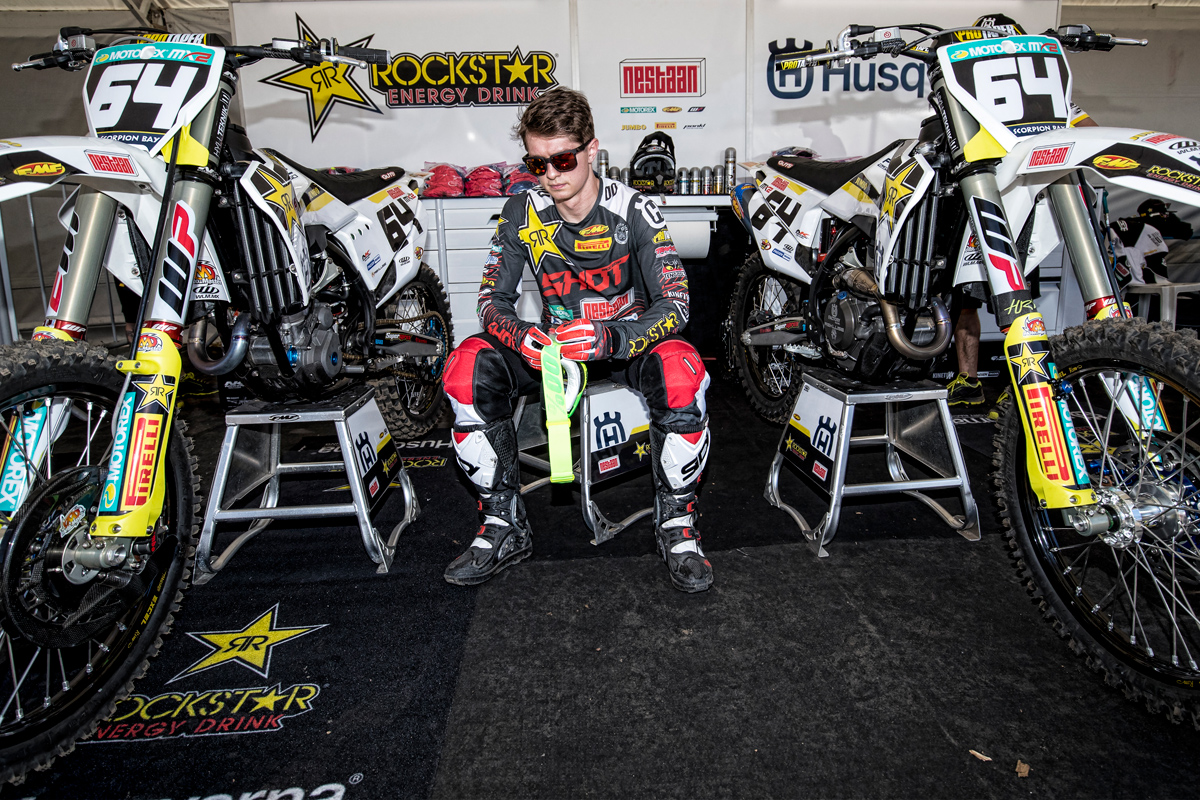
“The second year really was the hard part because the first was a blur; he went over to race three GPs and got an offer to change teams and had to get ready for the rest of the season and life in Europe in one week,” Mitch adds. “He did well in the flyaways – maybe high top ten – but then back in Europe it was a disaster. He was barely scoring points, with no injury and no excuse. I think it hit him pretty hard. It was a strange environment: where he was living, the food, team, culture. It was not a good year for him and there were times when he’d call and he was as homesick as anybody could be. Totally miserable. I remember one phone call where he sounded so miserable and it was followed by another three calls from the team and Kawasaki and they said: ‘maybe you should come over, he’s homesick and everybody knows it’. So we did, we went over and had a long talk. I said he’d regret it for the rest of his life if he quit something in the middle of the season. The hard times are what will make you better in the long run and we just need to stick this thing out. And he agreed, got his head down and got through it.”
A first win arrived in Mexico but injury disrupted progress and eventually the key move was Covington’s decision to sign for Jacky Martens’ Husqvarna team for 2016. He settled in Belgium, committed more time to living and training in Europe and discovered that environment crucial for all-round growth. For the last two MX2 seasons he has been a front-runner in the class.
“I was impressed with him as a rider and did a background check and it turned out to be true that he is a good test rider,” says Martens. “He is correct, polite and presents himself like a professional sportsman, so the choice was easy to take him. We had a great three years together; it was only spoilt through some injuries but that’s racing.”
“I gotta ‘give it’ to Thomas: he never questioned whether he’d succeed at this,” stresses Mitch. “Even at his lowest points he did not want to quit anything because he had an obligation and secondly I think he knew he could win in Grand Prix. He believed it. It’s a good story that he stuck it out. He is now comfortable and independent living on his own. He has a mild confidence about him as a person. He doesn’t get too worked up about much. I think the whole experience accelerated his maturity.”

Part of the prolonged settling-in period for Covington involved music. The Alabama family are immersed in their Country roots (Mitch Covington also plays and performs) and it wasn’t long before Thomas, a piano player, sought solace in learning guitar strings. Any social media followers of TC or MXGP will have seen the rider tinkling ivories on airport instruments or learned of his first proper ‘gig’ in Belgium this summer where he opened for an American band in Mol to excellent reviews.
Covington used music as a form of company – shedding light on the difficulty of being young and so far from home – and also as a way to kill boredom when not training or socialising with the group of friends he had built up in Belgium.
The guitar sits in his motorhome and is a quiet and untouched third party during our interview at Assen and his penultimate Grand Prix. Thomas laughs and smiles quite a lot, and in a self-deprecating way also. He’s quietly spoken but also thoughtful. His demeanour has won a lot of fans inside the paddock in the way that his barrelling style and propensity to mix holeshot potential with fluffed starts and attacking recovery-riding has gathered attention on the track.
“He is a unique character in this world, he is almost too nice to be a racer but he manages that well because he also brings those other traits that you need to be a winner,” reveals team coach Rasmus Jorgensen. “If you don’t respect him on the track then he won’t respect you but he doesn’t have half the ego of some of the other guys.”
We talk to Covington as a Grand Prix winner but also as a racer that seems to be only just realising some of his full potential. He is aware that ejecting out of MX2 at a time when he would be a valid title contender for 2019 is unfortunate but he also has to follow the path of circumstance and the chance to fill Zach Osborne’s championship-winning 250 saddle was hard to turn down. Still, there is a general feeling that his best was only just emerging in MX2.
“He might not have the best week but has the ability to then win the GP on Sunday whereas many riders need to have those ‘positive days’ in training to make a result,” adds Jorgensen. “He is balanced mentally with his whole process. He doesn’t care if he has a bad day because he knows he can still win at the weekend.”
There could be an element of ‘slow burn’ about Covington. Not only for all the obstacles he overcame with his lifestyle change (Jorgensen: “for me he is a ‘full euro’. He never had a problem socialising. He is a different kind of American. I think it will be very different for him to go back now.”) in five years but also on the bike. “I don’t want to be too negative but I think he took too long to come back after the knee injury,” assesses the Dane. “I think he tended to have a dip at the beginning of seasons and if you want to be a title contender then you need to be looking at the top five from the very first rounds. He hasn’t been able to do that, for the last two years at least, and it’s hard to catch those up to the likes of the KTM boys. On a bad day they are fifth or sixth and a bad day for Thomas was a DNF or a fifteenth; that was the difference.”
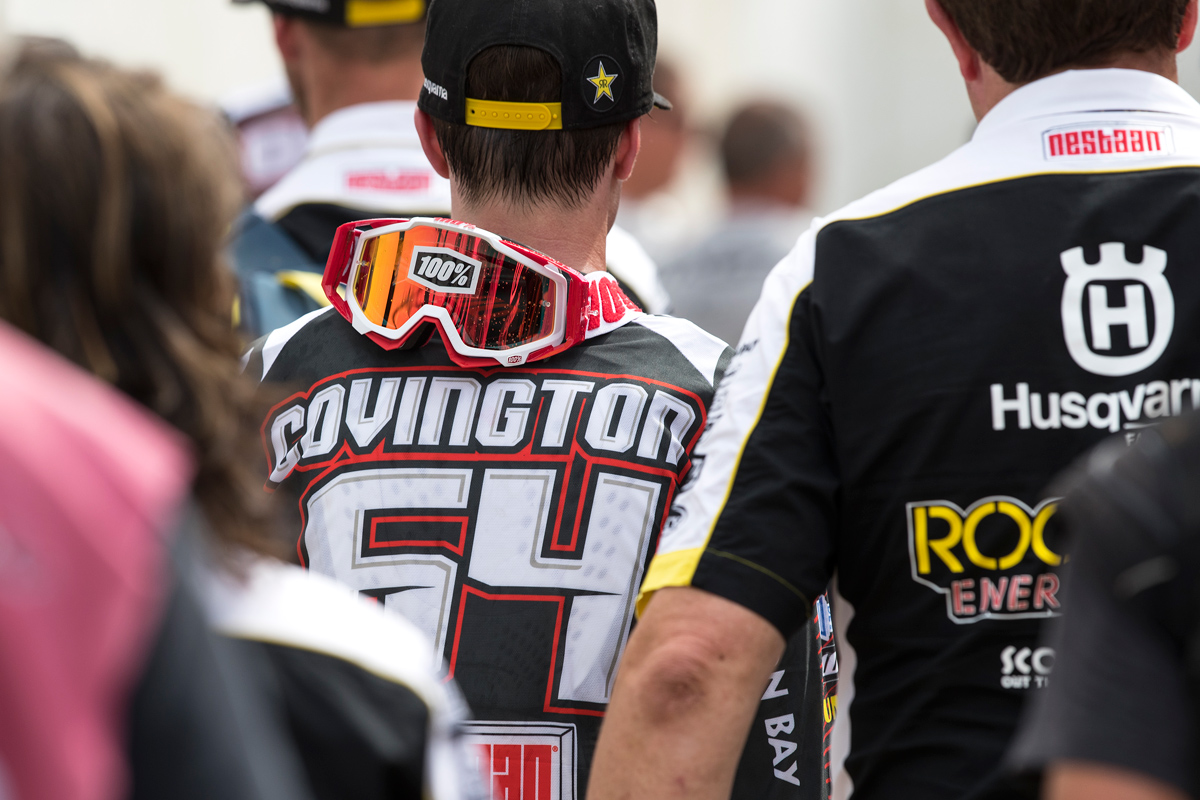
“He doesn’t want to use an excuse if something isn’t working well,” opines Martens. “Every rider has his own mentality and I don’t push a rider if I don’t think he can handle it. You cannot order a rider to do something or to change but you can create a feeling that he might be more aggressive at the start, for example. Thomas could be better with his starts but then he does something like Assen where he started from the outside gate and was ahead of everybody!”
Before that impressive display out of the sandy Dutch gate we were quizzing the man himself in his camper…
Let’s start with the music. There was a clip of you playing the piano in an airport on social media last year. That was a bit of a surprise. Was it something you wanted to keep quiet?
I don’t think it is your typical mix: motocross and something like playing the piano. I started lessons from when I was four or five and since then it was a bit ‘off-and-on’. I played a lot in Church growing up. My Dad always played guitar and was in a local band in our town and sang quite a bit.
What kind of music was that?
Country. I could never play the guitar; it just didn’t click for me. My hands weren’t big enough I think. I always wanted to because my Dad played and then for my eighteenth birthday he bought me a guitar. When I moved to Europe I brought it with me because I had quite a bit of time on my hands. I didn’t know too many people at first so I was on my own quite a lot in an apartment. It started to click then because I spent hours and hours on it occupying my time.
Is it a bit like languages? Learning another instrument is like moving from being bilingual to trilingual? Once you know chords then it’s about transfer?
I guess. For music it’s all related. Even if taking piano lessons when I was younger was not the greatest thing in the world I’m glad I did it now. I barely touch the piano now. I have a few songs memorised, which helps in airports! I can play along with a band if I need to. I have a keyboard in my place in Lommel but I’m not sure why I bought it because I’m on the guitar more. But I think my background with the piano helped.
No offence but I guess many don’t normally associate motocrossers or professional racers as the most cultural of people; maybe it is to do with the amount of time and energy motocross requires. Even though there are a couple, it’s hard to imagine a successful rider who is also an accomplished musician…
Sure! I think motocrossers are usually put into that stereotype of being meatheads that just like to train. We can only hold the gas on when it matters! I think there are actually quite a lot of motocrossers that are that way if I’m being honest. I guess I am wired a little bit different.
Have you met many other racers with hidden creative abilities?
Not too many. I’ve heard that Brian Hsu is a good violinist and that’s pretty cool because it is one of the hardest instruments to play. I don’t know Brian so I have talked to him about it. Is music like an escape? I think so. On my days off my trainer Joel [Roelants] will tell me to rest and I look forward to those days because it means I can sit there and work on my guitar. It is cool to have something different, just to get my mind off racing. Even on race weekends I will have it in the camper and will mess around on a Friday night.
People might assume you’ll just be binging on Netflix otherwise…
Ha! I do watch Netflix quite a lot, I’m not going to lie but then I try to force myself away from it to play or read a particular book. Something to better myself. I moved to Europe at a super-young age and had time. I thought ‘not many people get this opportunity, I have to make the most of it to better myself in every way’-
Was it a coping mechanism as well?
Yeah. I don’t think I meant for it to be so…but it worked out like that. I liked the process of learning songs. I’m ‘big’ on lyrics. And I like songs where I can relate to the words. Many will be talking about things in southeast America and Alabama, where I’m from. I play a lot of stuff by songwriters from Alabama because it reminds me of home. Probably a big motivation was also so I could pick up the guitar and play for friends when they come over. It’s cool and fun to play after dinner. Obviously it’s cool when it comes to girls as well! Anything can be motivating for that!
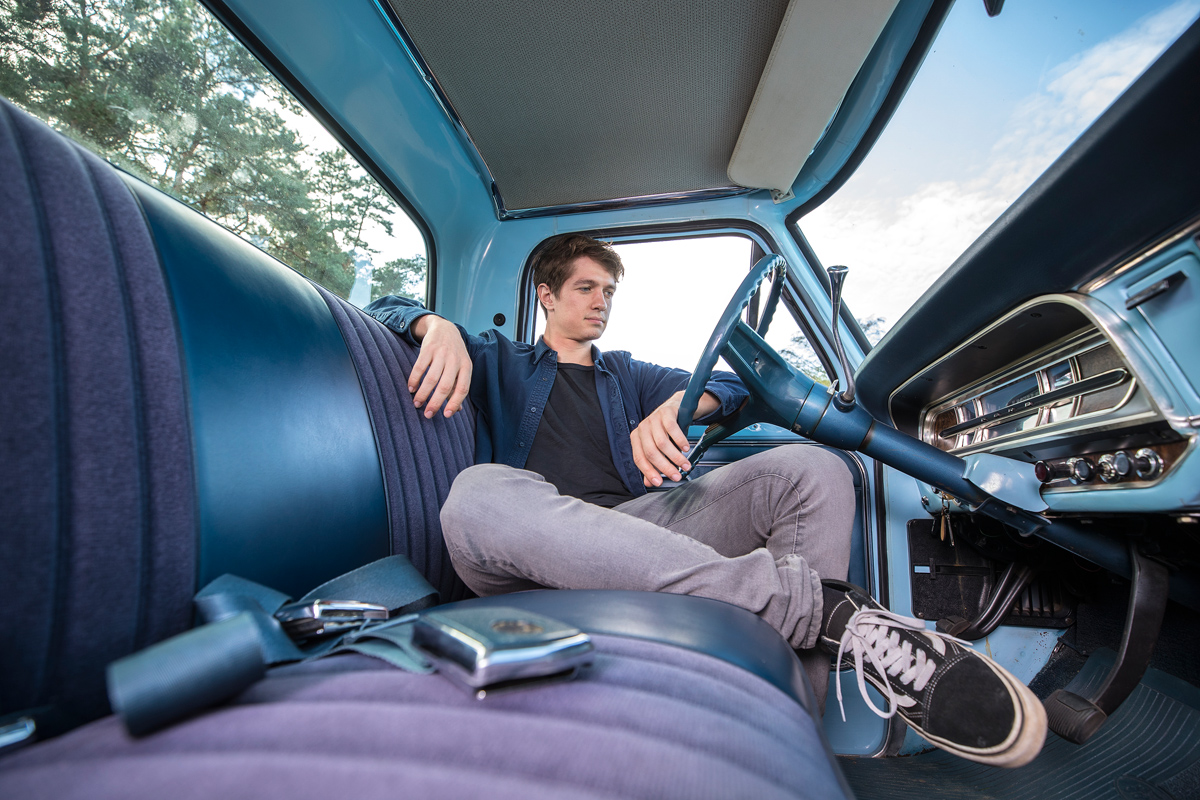
You played a support slot at a gig recently in Mol, Belgium. Was that the first time?
It was my first legit gig. A couple of other times I’ve have just showed up at bars to play. I did that twice actually when we were in Bali between the Indonesian Grands Prix. A couple of friends went up to the performer and asked if I could play a few tunes and I think he was happy to get a break. I played for half an hour one night. I also did an open mic night in Eindhoven. For Mol a friend called and said a band was coming over from LA and they didn’t have anybody to open for them, would I consider it? Yeah, sure! Then I found out I’d have to play for forty-five minutes! So I had to put together a proper set list for the first time and practice and rehearsed. I wanted to do it straightaway because I knew the more I played shows like that the better I’d get. You need experience. I think everyone enjoyed it, but I watched the video back and was ‘oooh’ [grimaces]. Each time I play I think I will get better.
Can you draw a parallel between performance on the stage and also at a Grand Prix?
The main question people asked was: ‘were you nervous?’ and the answer was a definite ‘yes’. Much more so than a Grand Prix gate drop. Actually riding at the 2017 Motocross of Nations was a similar feeling. You get to a point where you think ‘I’m just going to get up there and do it’ and that’s like being in the start gate. Then once it drops you just ‘go’. Instinct takes over. I knew when I would be there and they’d call me on stage then it would be a like a gate drop.
Generally you can hide a small mistake on the track; I’m guessing that’s not really possible on stage. Is that focus for both more or less the same?
If you have a band behind you then you can get away with some mistakes because they carry the song. But it was just me and the acoustic guitar up there so that made it a bit more nerve wracking. I did make a few mistakes but I just kept going and I don’t think people really noticed it.
It must also take balls to sing…
That’s what I’m most worried about. I never sing when I played piano, not in public anyway, but my Dad is probably the one that pushed me to do that. He never sung either until he was older and I wasted my younger years not bothering. He always said that people enjoy it if you try. So I thought ‘screw it, I’ll do it’.
Did living on your own overseas and enjoying success professionally help with confidence generally and therefore in music?
Yeah. Even a few weeks ago he told me that when I started singing in public then I’d start winning races. It’s funny. I think it is connected and it’s about confidence.
It’s an unusual existence isn’t it…?
It’s true. This last year in Europe I have made an effort to try and take-in every experience and enjoy it as much as I can. I’m 22 years old and I feel like these years here is something I will talk about more than anything back home. There were many cool things that not many people would get the chance to see or do. Playing to a bunch of Belgians was a good warm-up, also if I wasn’t that good then at least I’d be leaving and they could talk bad about me when I’ve gone!
Does music inspire or pump you up before a race?
I don’t know about inspire…but it gets me in a good mood before the race. I’ll be dancing around the camper a bit.
Is there a race playlist?
I’ve been trying to put one together. I know that Darian [Sanayei] has one or puts one together every week for the race. Recently I’ve been putting on Post Malone and his new album. There is one song called ‘Win’ which is a bad song but it gets me fired up.
It took you a while to get going in Grand Prix. There were circumstances involved…but why did it take so long to acclimatise and excel?
There is no [single] reason that sticks out in my mind. I think I made some pretty good decisions but if I could turn back and there was the opportunity to hand then I would have joined my current team earlier. Not that I don’t appreciate everything that CLS did for me but I think my riding and my whole programme took a big step up when I started working with Jacky and Joel. Other things? People have said ‘you should have spent more time in Europe in your first two years’ but I was just a kid, 17-18 years old. I didn’t want to spend holiday season in Europe by myself. Looking back I would not change anything I’ve done.
With hindsight were you too young to come over?
It is definitely a lot, but I think making decisions like that helped me to mature pretty quickly. I’m glad I did it at that time though and I think it will benefit me later in life. Not necessarily for racing but every other part of life. I’ve been trying to put together a ‘going away’ memento for all the people who have been around me in Holland and Belgium for the last five years. I was wandering about what to say, and although I’ve had some good races and results in GPs the thing I cherish the most is the relationships I’ve formed with these people. The teams, Kawasaki and Husky: that’s what means the most to me, certainly over winning four GPs.
Your musicality was a surprise to some but your development as a racer was also impressive to chart. It’s been a nice story…
People have always been surprised when I’ve done well. Which is fine! Up until this year and last year it [good results] was expected. Before that I’d win a qualifying race and people would be like ‘where did that come from?!’ I’d always been fast enough but I might have finally made a start or just put it together. I’ve never been the guy that people had pegged to win. I was not a complete underdog but maybe like a dark horse.
Imagine we’re at A1 and not a Grand Prix. Can you visualise how that environment will be? More pressure? Less friendly? More fantastic? What comes to mind?
Hmmm. I think it will just be bigger, purely because it is Supercross. If I think of Anaheim 1 then it will be weird to know I am one of the guys racing because I have always gone there just to watch. I’ve been involved but never really as the guy who is expected to go out there and perform. I think there will be more pressure. GPs, for me, are really laidback and really friendly. I cannot see the races in America being the same but maybe it will surprise me. It’s really friendly here. Normally I’m parked next to Cairoli and he’ll be like ‘hey Thomas! How’s it going?’ and he’ll come in a use my ice machine. Or [there is a relationship with] people I race against. Jed Beaton [Kawasaki MX2 rider and Covington’s replacement on the Rockstar Husqvarna next year] was in here earlier and we’ve had some pretty heated situations this year and we were watching the F1 qualifying together. It’s nice.
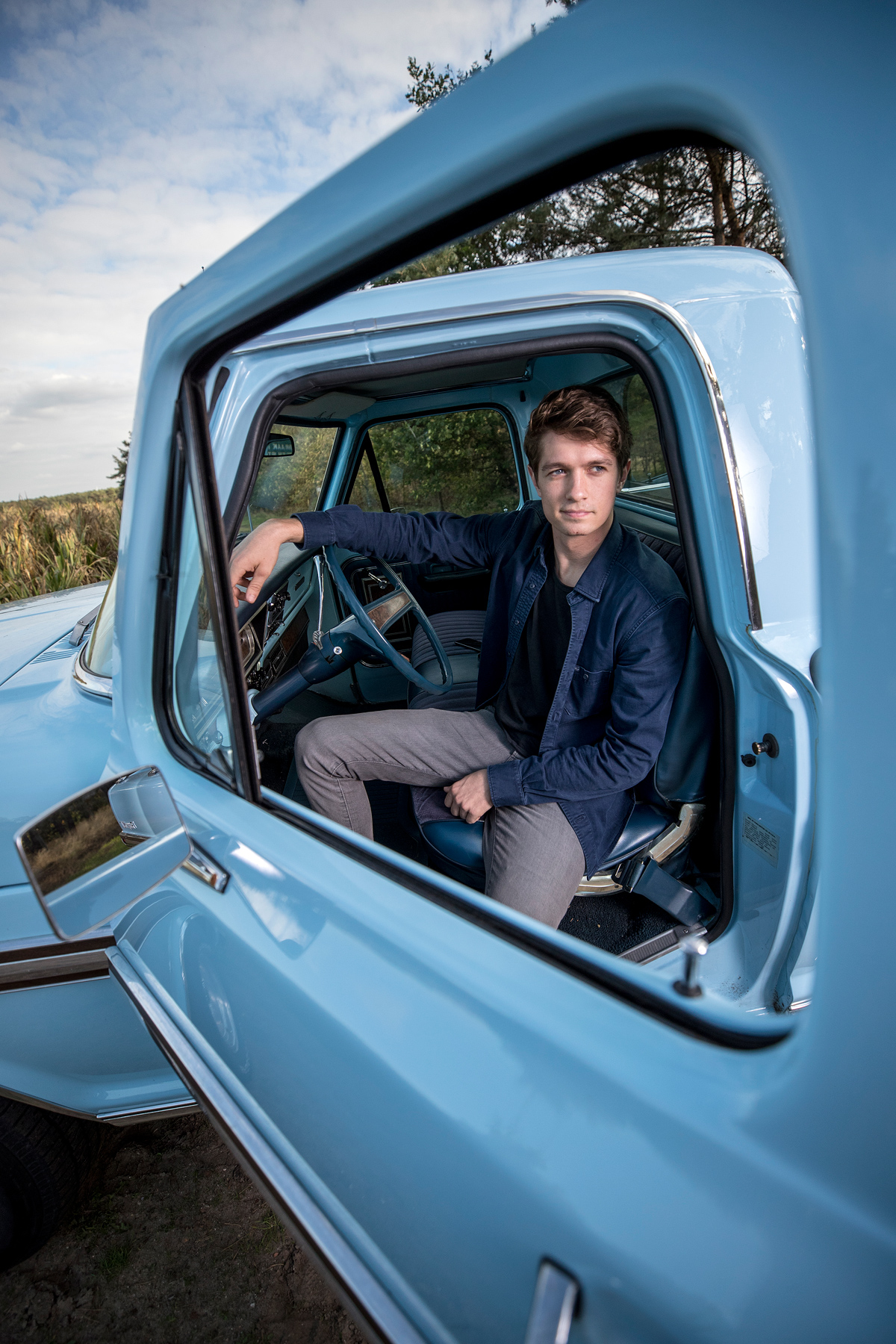
Will coming back to visit a GP feel a bit like a holiday then?
Totally. It would be really nice. I’d love it. I’ve been joking with the team actually that if I have a weekend off next year then I might be over for an MX2 race again.
Not wanting to get too far ahead it must be encouraging to remain an important rider for a European manufacturer for future options, whatever the series…
Yeah, I really like being involved with Husqvarna. Mainly because I’m a rider that really likes testing and developing the bike. Luckily they have trusted me enough to do a lot of that for them in the last couple of years. It is good to be with a brand that cares enough about that sort of stuff and if I want to change something or fancy something different or I have an idea then they make it happen. Whereas with other brands – if they’re in Japan or whatever – it takes more time to do that. I have never done the level of testing that we do here. There is a big deal of flexibility with the US side. If I go home for two weeks to ride then they can see all my settings and they have bike identical to what I ride here.
Jeffrey Herlings is currently the benchmark for global motocross it would seem. You’ve raced against him. Why and how has he been able to accomplish so much?
He just works the hardest. Without a doubt. Personally I could not handle what he does; I would be sick every week. I feel like I have been on the line of over-training and being sick quite often. It is a constant battle to stay healthy and I don’t know why. If I’m training too much then I get tired and start to get sick. I cannot keep going. He just does motos day after day, week after week. He goes home and cycles and is then back in the gym in the morning, I remember racing Zwarte cross [Dutch Championship] and we had qualifying on Saturday and on his way home that day he stopped at a practice track and did another moto and yet more starts. The next morning I saw he was on the rowing machine, turned up and won both motos and the Dutch title and then went home again. I was like ‘whoah’. I was sitting eating my dinner and looking at Instagram stories and he was out practicing starts somewhere and I thought ‘what am I doing?!’ I did ride a little bit with Jeffrey. At one point during the season he was like ‘yeah, come with me and do what I do’. So I did it for one week and it was really good for me for a short period of time but there is no way I could keep that up all year. Maybe it’s because he has done it for so long that he has a tolerance to it. Someone like Cairoli – and I haven’t spent that much time with Tony – but it seems he is a little the opposite: he’s riding once a week and wanting to feel fresh at the weekend. Obviously he is a bit older. I feel I relate more to Cairoli!
You’re leaving Darian to fly the U.S. flag next year. Do you think more American riders and kids should be receptive to a GP ride?
Yeah, I think so and I think it is coming. There are more eyes on GPs since [Ryan] Villopoto came over. I have felt it as well. I get messages on social media and through contacts asking how they can get into a team in Europe. I feel that it is not easy. The communication is not there. Team Managers in Europe cannot really get out to Loretta Lynns to see these kids ride. The top guys coming out of amateurs there that would be a good fit for teams here will go to a team in the US because that’s all they know. It means the GP teams might go for a second tier guy and they won’t do so well here…because it’s so hard. Darian kinda got squeezed out of a Pro deal in the US and came over here and it was perfect for him and would perhaps be for a rider in a similar situation. It definitely hasn’t been easy for him but he’s finally figured it out. I hope more American kids consider MX2 as an option but they need a good team to take care of them over here and that’s not easy to find.
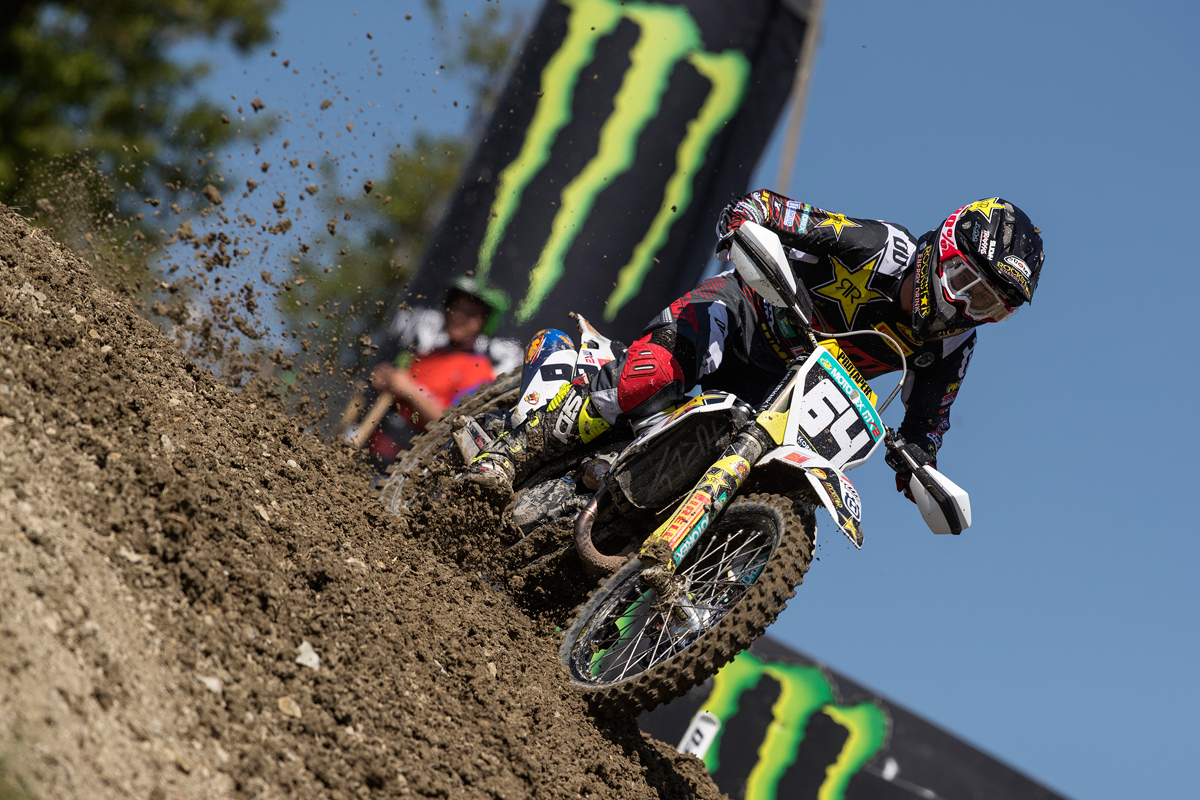
Covington had his bags packed at Imola for his last grand prix (at least as an MX2 rider). There is now a school of thought about how he will adapt to US racing. Post-Motocross of Nations there are already calls for him to represent Team USA at Assen in 2019 (for what would be his second turnout) and his motocross education in the FIM world championship should stand him in excellent stead for the Lucas Oil Pro Nationals (especially when judging the efforts of previous grand prix riders’ appearances like Herlings, Desalle, Simpson and more long-term participants like Musquin, Roczen and Ferrandis). Supercross will be the biggest challenge.
“I think it will be tough for him because he has been in GPs for five years now,” says Jorgensen. “I think he needs to go into Supercross and treat it with a lot of respect and not with ambitions of winning anything in the first year. He needs to build up safely and slowly and not look at his teammates or anything like that. If he can get through this year and with solid results in the Mains then this will be a success for him. He’ll crush it Outdoors and then have another winter to prepare again.”
“Thomas knows his job and is straight to the point and nothing is too much: from riding, testing, training or even spending a lot of time travelling. He does everything a top rider needs to do,” vouches Martens.
“It [supercross] would have been a lot of pressure at 17 because he was at Pro Circuit, which was the top team at the time,” says Covington Snr. “Now he is coming back and he’s not worried about that. He’s genuinely not concerned about competing in the US. He has an air of confidence about it.”
It’s easy to be envious of Covington. He’s had an adventure and now stands on the precipice of another. He’s also clearly proficient with at least two of the vocations in his life. Jacky Martens even describes him as “the ideal son-in-law”. From a raw and promising youth with good family connections (another reason the Rockstar Husqvarna transfer was beneficial for his progression) #64 has risen to the point where he is one of the USA’s premier international off-road racing athletes. More excellence on home turf next year and the distinct possibility of an MXGP ‘sequel’ means Thomas will not be changing his tune any time soon.
By Adam Wheeler @ontrackoffroad
Photos by Ray Archer @rayarcherphoto

